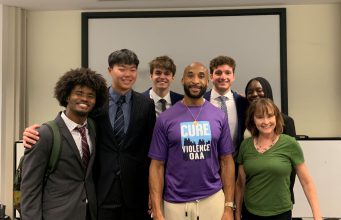Each MS in Business Analytics (MSBA) cohort at Goizueta Business School takes part in a semester-long experiential learning project that puts the students’ foundational coursework and training to task. Known as the MSBA practicum project, student teams join forces with corporate sponsors to solve current, real world business problems.

Ramnath Chellappa is professor of information systems and operations management and associate dean and academic director of the MSBA program. He calls the practicum the “crown jewel” of the 10-month MSBA program. “You can think of the analytics practicum as a kind of internship,” Chellappa explains. “The students go on to solve a real business problem that really matters to our client. And in this way, the students verify that all the techniques that they’ve learned are applicable to what the industry cares about.”
Scott Radcliffe, MSBA managing director, believes the course separates Goizueta’s MSBA program from other business school analytics programs. “It’s part of what gives our students a holistic and realistic experience,” explains Radcliffe. “The output isn’t just a deck. It’s a piece of software. It’s an application the clients can use.” The practicum also showcases the MSBA program’s focus on the integration of technology, data, and business context. “We take that really seriously,” says Radcliffe. “That integration is a different value proposition.”
Collaborating with Corporate Sponsors
Before the practicum begins, Radcliffe and Chellappa spend a significant amount of time in preparation with potential company sponsors. They start by identifying and clarifying the types of problems the sponsors are facing. “There’s a commitment from the company’s side to put time into this in order that it be successful,” says Radcliffe. The best corporate sponsors have, according to Radcliff, “doable yet complex” problems that the students can solve utilizing the skills they’ve learned in the MSBA program.
This semester, 20 teams of five students each are collaborating with corporate sponsors to solve real business challenges. Companies included The Home Depot, Delta Air Lines, Bank of America, Paramount +, Best Buy, and Focus Brands.



During the practicum, companies grant the students access to proprietary data and data support (students and Goizueta faculty sign non-disclosure agreements), as well as access to one business resource and one technical resource at the company. In addition to frequent contact with the student teams, sponsors often arrange site visits and stakeholder meetings with the students.
The interaction between students and the client is a critical success factor for both sides.
Scott Radcliffe
“We ensure the students have solid consulting and project management processes to follow,” explains Radcliffe. “However, having a passionate, engaged client is the most critical element in the equation. It provides the students with the right learning environment. It also gives them the required domain knowledge to generate real outcomes from their code and recommendations.”
From Pitch to Presentation
The practicum begins with a “pitch day” event in the fall where each corporate sponsor has 15 minutes to pitch its issue to students. “The pitch day serves as a bridge connecting students with companies, providing a gateway to a diverse range of data projects spanning industries from finance to telecommunications,” says Jenevieve Zhang MSBA24. Zhang is currently working with a global provider of software, hardware, and digital commerce solutions. Her project aims to “reduce device downtime by proactively dispatching repair technicians before device failures,” she explains.
In an effort to form balanced teams, students first must rank each of the company pitches. An algorithm then takes into account the student’s GPA, country of origin, technical ability, and gender to form teams.
Every student on the team has an additional role—just like in the consulting world. Project manager, primary technical person and so on. Everything we do is about creating real world experiences.
Scott Radcliffe
Student teams meet weekly with Radcliffe, an academic advisor, and with professional coaches. These regular meetings help ensure that the teams are on track and that the students are getting the support they need from the client. Faculty grade the projects based on professionalism, final presentation, the quality and timeliness of the work, peer feedback, and the team’s ability to demonstrate an understanding and application of data mining methodology. Student team deliverables consist of a technical package with empirical models, code, and documentation, as well as a deck that illustrates the business benefits of the technology.
For Zhang, the practicum is a way for students to “seize the opportunities” that are presented to them, she says, adding: “I am beyond excited at the prospect of applying the advanced technical skills and knowledge I’ve acquired during the fall semester into the real-world business landscape.”
Learn More:
Goizueta’s STEM-designated Master’s in Business Analytics combines business, data, and technology to make you an effective business data scientist for a data-driven world. Find out how Goizueta can prepare you to launch a career in data science in some of the fastest-growing fields in business.











